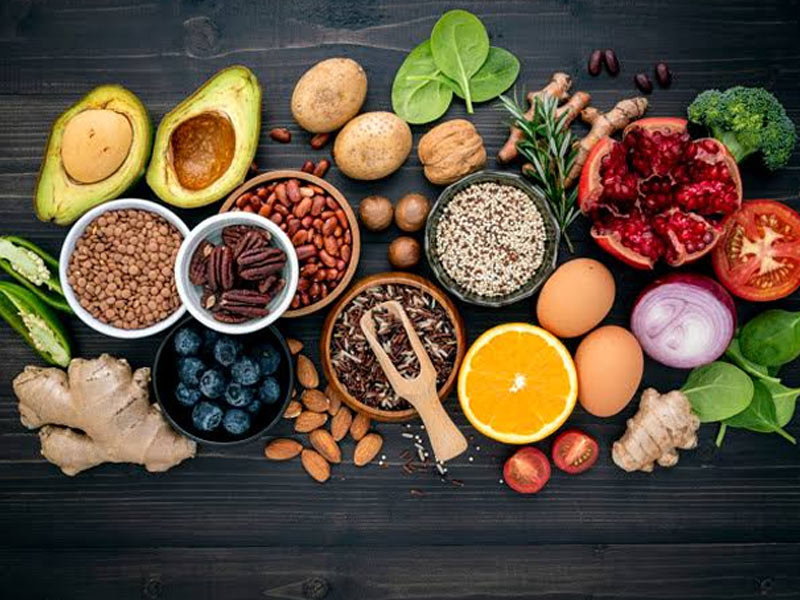
Changing what foods you eat can lower your cholesterol and improve the armada of fats floating through your bloodstream. Adding foods that lower LDL, the harmful cholesterol-carrying particle that contributes to artery-clogging atherosclerosis, is the best way to achieve a low cholesterol diet. Different foods lower cholesterol in various ways.
Table of Content:-
Some deliver soluble fiber, which binds cholesterol and its precursors in the digestive system and drags them out of the body before they get into circulation. Some give you polyunsaturated fats, which directly lower LDL. And some contain plant sterols and stanols, which block the body from absorbing cholesterol. Keep reading to know about foods to keep cholesterol levels in check.
Foods that lower cholesterol
A person’s diet plays a crucial role in how healthy their cholesterol levels are. Eating foods that keep cholesterol within a healthy range can help prevent health issues, including a heart attack or stroke. Here are some foods that help in managing cholesterol levels:
1. Avocado

Avocados are rich in heart-healthy nutrients. A 2015 study concluded that eating one avocado a day as part of a moderate fat, cholesterol-lowering diet can improve cardiovascular disease risk, specifically by lowering LDL cholesterol without lowering HDL cholesterol.
2. Apple
A small 2019 study found that among 40 participants with mildly high cholesterol, eating two apples a day reduced both total and LDL cholesterol levels. It also lowered levels of triglycerides, a type of fat in the blood. One apple can contain 3–7 g of dietary fiber, depending on its size. In addition, apples contain compounds called polyphenols, which may also have a positive impact on cholesterol levels.
Also read: Know These 7 Natural Ways To Lower Cholesterol Levels
3. Olive oil
Extra virgin olive oil features regularly in the heart-healthy mediterranean diet. One of its many uses is as a cooking oil. Substituting saturated fat, found in butter, with monounsaturated fat, found in extra virgin olive oil, might help reduce LDL levels. Moreover, extra virgin olive oil has antioxidant and anti-inflammatory properties that can be very beneficial to cardiovascular and overall health.
4. Salmon
Fatty fish has high levels of omega-3 fatty acids, which can reduce your triglycerides — a type of fat found in blood — as well as reduce your blood pressure and risk of developing blood clots. In people who have already had heart attacks, omega-3 fatty acids may reduce the risk of sudden death. Omega-3 fatty acids don't affect LDL cholesterol levels. It is high in salmon, mackerel, trout and tuna.

5. Oats
Oatmeal contains soluble fiber, which reduces your low-density lipoprotein (LDL) cholesterol, the "bad" cholesterol. Soluble fiber is also found in such foods as kidney beans, Brussels sprouts, apples and pears. Soluble fiber can reduce the absorption of cholesterol into your bloodstream. Five to 10 grams or more of soluble fiber a day decreases your LDL cholesterol.
6. Dark chocolate
Cocoa, which can be found in dark chocolate, contains flavonoids, a group of compounds in many fruits and vegetables. Their antioxidant and anti-inflammatory properties can benefit health in various ways. In a 2015 study, participants drank a beverage containing cocoa flavanol twice a day for a month. By the end of the trial, their LDL cholesterol levels and blood pressure had decreased, and their HDL cholesterol levels had increased.
Also read: How To Control Your Cholesterol Level? Expert Tips
7. Beans
Beans are especially rich in soluble fiber. They also take a while for the body to digest, meaning you feel full for longer after a meal. That's one reason beans are a useful food for folks trying to lose weight. With so many choices — from navy and kidney beans to lentils, garbanzos, black-eyed peas, and beyond — and so many ways to prepare them, beans are a very versatile food.
Also watch this video
How we keep this article up to date:
We work with experts and keep a close eye on the latest in health and wellness. Whenever there is a new research or helpful information, we update our articles with accurate and useful advice.
Current Version
